2018 年 12 月国家开发银行招聘考试真题及答案
第一部分 英语测试
1. Great efforts to increase wheat production must be made if bread shortages
____avoided.(C )
A. will be B. can be C. are to be D. were to be
2. According to official statistics, retail sales in China rose 10% and12.2%
in the first and the second quarter ____ this year. ( C)
A. accordingly B. correspondingly C. respectively D. individually
3. If he ____ on tourists for his business, he would have to close his shop.
( C)
A. depends B. will depend C. depended D. has depended
4. The wealth of a nation should be measured____the health and happiness of its
people as well as the material goods it can produce. ( D )
A. in regard with B. in line with C. by means of D. in terms of
5. Because of the complexity of the modern machine, most offices require
secretaries ____.( A )
A. to have specified training B. specified in traing C. to train specifiedly
D. training specified
6. Mrs. Nancy was wakened midnight by the ringing of the phone several hours
after the ship that her husband was on had been____.( C )
A. fired B. decayed C. wrecked D. collapsed
7. In order to be a good scientist, ____.( C )
A. mathematics is urgent
B. one should have the mathematics
C. one must
understand mathematics
D. mathematics is important to be understood
8. We may often be puzzled by ways of expression that the native speaker of
English does not even have to____, as English is not our first language. ( D )
A. think out B. think for
C. think over D. think about
9. “Did the audience participate in the play?”
�
Yes, those actors ____to involve the audience.” ( C )
A. whom it was the function
B. of whom the function was
C. whose function
it was
D. whose were the function
10. It is a legal____for parents to ensure that their children are provided with
efficient education suitable to their age. ( B)
A. sympathy B. obligation
C. impulse D. influence
11. The newly-built principal museum seems____ enough to last a hundred years.
( B)
A. steady B. substantial
C. sophisticated D. spacious
12. Victor certainly talks a lot and he’s never interested in what____has to
say. (A )
A. anyone else B. no one C. nobody else D. somebody other
13. The mayor didn’t have time so far to go into it____, but he gave as an idea
about his plan. (C )
14. “What can I do for you, sir?”
“I want ____.” ( A )
A. a dime’s worth of candy B. candy a dime’s worth
C. a dime worth of candy D. a dime-worth candy
15. When traveling, it is possible that you may be advised to take the tr
avelers’ checks, which provide a secure____ to carrying your money in cash.
( C )
A. selection B. preference
C. alternative D. substitute
16. Old Chinese are not used to buy things on____ and are likely to save as much
money as possible. ( C )
A. deposit B. debt
C. credit D. sale
17. “Eric nearly always wins the science award.”
“That’s because his project are____.” ( D)
A. extremely presented well B. well presented extremely
C. presented well extremely D. extremely well presented
18. As the group of persons ____ together in a conversational knot, each
�
individual expressed his position in the group by where he stands. (D )
A. squeeze B. pack
C. pad D. cluster
19.____he does his work, I don’t mind what time he arrives(B )
at the office. A. So far as B. So long as C. In case
D. Meanwhile
20. In 1776 the United States announced the Declaration of Independence
to____from the British Empire and became an independent country. ( B )
A. pull down B. break away C. get off D. dropp off
Questions 21-40 are based on the following passage
Have you ever wondered what our future is like? Practically all people _21_ a desire
to predict their future _22_.Most people seem inclined to _23_ this task using causal
reasoning.First we _24_ recognize that future circumstances are _25_ caused or
conditioned by present ones.We learn that getting an education will _26_ how much
money we earn later and that swimming beyond the reef may bring an unhappy _27_ with
a shark.
Second,people also learn that such _28_ of cause and effect are probabilistic(可
能的) in nature.That is,the effects occur more often when the causes occur than when
the causes are _29_, but not always.Thus,students learn that studying hard _30_ good
grades in most instances,but not every time.Science makes these concepts of
causality and probability more _31_ and provides techniques for dealing _32_ then
more accurately than does causal human inquiry.In looking at ordinary human
inquiry,we need to _33_ between prediction and understanding.Often,even if we don't
understand why,we are willing to act _34_ the basis of a demonstrated predictive
ability.
Whatever the primitive drives _35_ motivate human beings,satisfying them
depends heavily on the ability to _36_ future circumstances.The attempt to predict
is often played in a _37_ of knowledge and understanding.If you can understand why
certain regular patterns _38_,you can predict better than if you simply observe those
patterns.Thus,human inquiry aims _39_ answering both "what" and "why" question,and
we pursue these _40_ by observing and figuring out.
�
21. [A]exhibit [B]exaggerate [C]examine [D]exceed (
A )
22. [A]contexts [B]circumstances [C]inspections [D]intuitions( B
)
23.[A]underestimate [B]undermine [C]undertake [D]undergo(
C )
24. [A]specially [B]particularly [C]always [D]generally(
D )
25. [A]somehow [B]somebody [C]someone [D]something(
A )
26. [A]enact [B]affect [C]reflect [D]inflect(
B)
27. [A]meeting [B]occurrence [C]encounter [D]contact( C
)
28. [A]patterns [B]designs [C]arrangements[D]pictures(
A)
29. [A]disappointde [B]absent [C]inadequate [D]absolute( B
)
30.[A]creates [B]produces [C]loses [D]protects(
B)
31.[A]obscure [B]indistinct [C]explicit [D]explosive( C
)
32.[A]for [B]at [C]in [D]with( D
)
33.[A]distinguish [B]distinct [C]distort [D]distract(
A)
34.[A]at [B]on [C]to [D]under(B
)
35.[A]why [B]how [C]that [D]where( C
)
36.[A]predict [B]produce [C]pretend [D]precede(
A)
37.[A]content [B]contact [C]contest [D]context(
D)
38.[A]happen [B]occur [C]occupy [D]incur(
B )
39.[A]at [B]on [C]to [D]beyond(
A )
40.[A]purposes [B]ambitions [C]drives [D]goals( D
)
Questions 41-45 are based on the following passage
At the age of twelve years, the human body is at its most vigorous. It has yet
to reach its full size and strength, and its owner his or her full intelligence;
but at this age the likelihood of death is least. Earlier, we were infants and young
children, and consequently more vulnerable; later, we shall undergo a progressive
loss of our vigor and resistance which, though imperceptible at first, will finally
become so steep that we can live no longer, however well we look after ourselves,
and however well society, and our doctors, look after us.
This decline in vigor with the passing of time is called ageing. It is one of
�
the most unpleasant discoveries which we all make that we must decline in this way,
that if we escape wars, accidents and disease we shall eventually "die of old age",
and that this happens at a rate which differs little from person to person, so that
there are heavy odds in favor of our dying between the ages of sixty-five and eighty.
Some of us will die sooner, a few will live longer--on into a ninth or tenth decade.
But the chances are against it, and there is a virtual limit on how long we can hope
to remain alive, however lucky and robust we are.
Normal people tend to forget this process unless and until they are reminded
of it. We are so familiar with the fact that man ages, that people have for years
assumed that the process of losing vigor with time, of becoming more likely to die
the older we get, was something self-evident, like the cooling of a hot kettle or
the wearing-out of a pair of shoes. They have also assumed that all animals, and
probably other organisms such as trees, or even the universe itself, must in the
nature of things "wear out".
Most animals we commonly observe do in fact age as we do, if given the chance
to live long enough; and mechanical systems like a wound watch, or the sun, do in
fact an out of energy in accordance with the second law of thermodynamics (热力
学) (whether the whole universe does so is a moot point at present). But these are
not analogous to what happens when man ages. A run-down watch is still a watch and
can be rewound. An old watch, by contrast, becomes so worn and unreliable that it
eventually is not worth mending. But a watch could never repair itself--it does not
consist of living parts, only of metal, which wears away by friction. We could,at
one time, repair ourselves--well enough, at least, to overcome all but the most
instantly fatal illnesses and accidents. Between twelve and eighty years we
gradually lose this power; an illness which at twelve would knock us over, at eighty
can knock us out, and into our grave. If we could stay as vigorous as we are at twelve,
it would take about 700 years for half of us to die, and another 700 for the survivors
to be reduced by half again.
41. Which of the following statements is INCORRECT? (
A )
A. Our first twelve years represent the peak of human development.
�
B. People usually are unhappy when reminded of ageing.
C. Normally only a few of us can live to the eighties and nineties.
D. People are usually less likely to die at twelve years old.
42. The word "it" in the last sentence of Paragraph Two refers to( B
)
A. remaining alive until 65.
B. remaining alive after 80.
C. dying before 65 or after 80.
D. dying between 65 and 80.
43. What is ageing? (
C )
A. It is usually a phenomenon of dying at an old age.
B. It is a fact that people cannot live any longer.
C. It is a gradual loss of vigor and resistance.
D. It is a phase when people are easily attacked by illness.
44. What do the examples of watch show? ( D
)
A. Normally people are quite familiar with the ageing process.
B. All animals and other organisms undergo the ageing process.
C. The law of thermodynamics functions in the ageing process.
D. Human's ageing process is different from that of mechanisms.
45. Which of the following best fits the style of this passage? (
B )
A. Argumentation.
B. Exposition.
C. Narration.
D. Description.
Questions 46-50 are based on the following passage
Imagine you are a citizen of Athens, enjoying a warm Mediterranean night in the
Theater of Herodes Atticus. You are wearing jeans and a T-shirt, listening to a great
concert.
Now rewind this picture 1,839 years. You are in the same seat, only you are
watching classical Greek entertainment and wearing a simple chiton, or tunic.
�
The city of Athens is a fun mix of the old and the new, the classic and the modem.
Often a little shop is located next to the rains of a temple, which is only a block
from a large, air-conditioned hotel. The great city of 2,500 years ago is still
visible today.
Ruins are the most obvious sign of ancient Athens, and the most famous of these
is the Acropolis. The Acropolis is a large hill that was the center of life in Athens.
On its slopes were temples, monuments, and theaters. From the top, you can see how
the urban sprawl (扩展,延伸) of Athens stretches out in every direction.
On the top of the Acropolis is the Parthenon. This was once a huge temple to
Athena, the city's patron. It was first completed in 432 B.C., but has been damaged
and destroyed several times. However, visitors can still see the "tricks" used in
building the Parthenon. The columns along the outside lean inward, and are slightly
fatter in the middle. The temple is also higher in the middle than on the sides.
All these effects make the Parthenon look perfectly straight from a distance.
Only a block away from the Acropolis is the neighborhood of Plaka. The area,
with its little shops and restaurants, is very popular with both tourists and locals,
and is an important part of modem Athenian culture.
Many great thinkers, writers, and political leaders lived in ancient Athens.
The ruins of their homes and favorite spots are scattered throughout the busy port
city. The hill where St. Paul addressed early Christian Athenians is located near
the Acropolis. Great thinkers such as Perikles and Demosthenes spoke to the civil
assemblies held at the Pnyx Hill. Today the Pnyx is an open-air theater for light
and sound shows.
Greeks still use some ancient sites, such as the Pnyx and the Theater of Herodes
Atticus. During Roman times, in 76 A.D., gladiators (角斗士) used the Panathenaic
Stadium for contests. The Olympics were held there in 1896, and today people still
jog and exercise in the stadium.
Tourism is very important to people who live in modem-day Athens. Thousands of
people come every year to see these ruins and to tour the many museums that house
artifacts from ancient times. This provides many jobs and brings money into Athens,
�
which helps the city pay for improvements. Athenians take pride in the
accomplishments of their ancestors, and people from all around the world come to
admire them. By looking around the city today, we can imagine what life was like
in ancient Athens.
46. Which of the following statements is INCORRECT about the city of Athens?
(
D )
A. The culture of the city is a mixture of the old and modem.
B. Traces of the ancient city can still be found.
C. Ruins and modem hotels co-exist in the city.
D. All the temples are not far away from air-conditioned hotels.
47. Which tourist attraction was ancient Athens most famous for? ( B
)
A. Plaka.
B. Acropolis.
C. Pnyx.
D. Parthenon.
48. According to the context, "tricks" in Paragraph Five refer to(
C )
A. mischievous acts.
B. confusing constructing skills.
C. skillful constructing methods.
D. constructing materials.
49. The writer mentioned all the following benefits of tourism in Athens for
Athenians EXCEPT(
D )
A. offering job opportunities to Athenians.
B. enriching Athenians by providing accommodation for tourists.
C. enabling Athenians to improve the infrastructures.
D. making Athenians proud of their ancestors.
50. What is the best title for the passage? ( B
)
A. Tourism in Athens.
B. Athens: Then & Now.
C. Historic Interests in Athens.
�
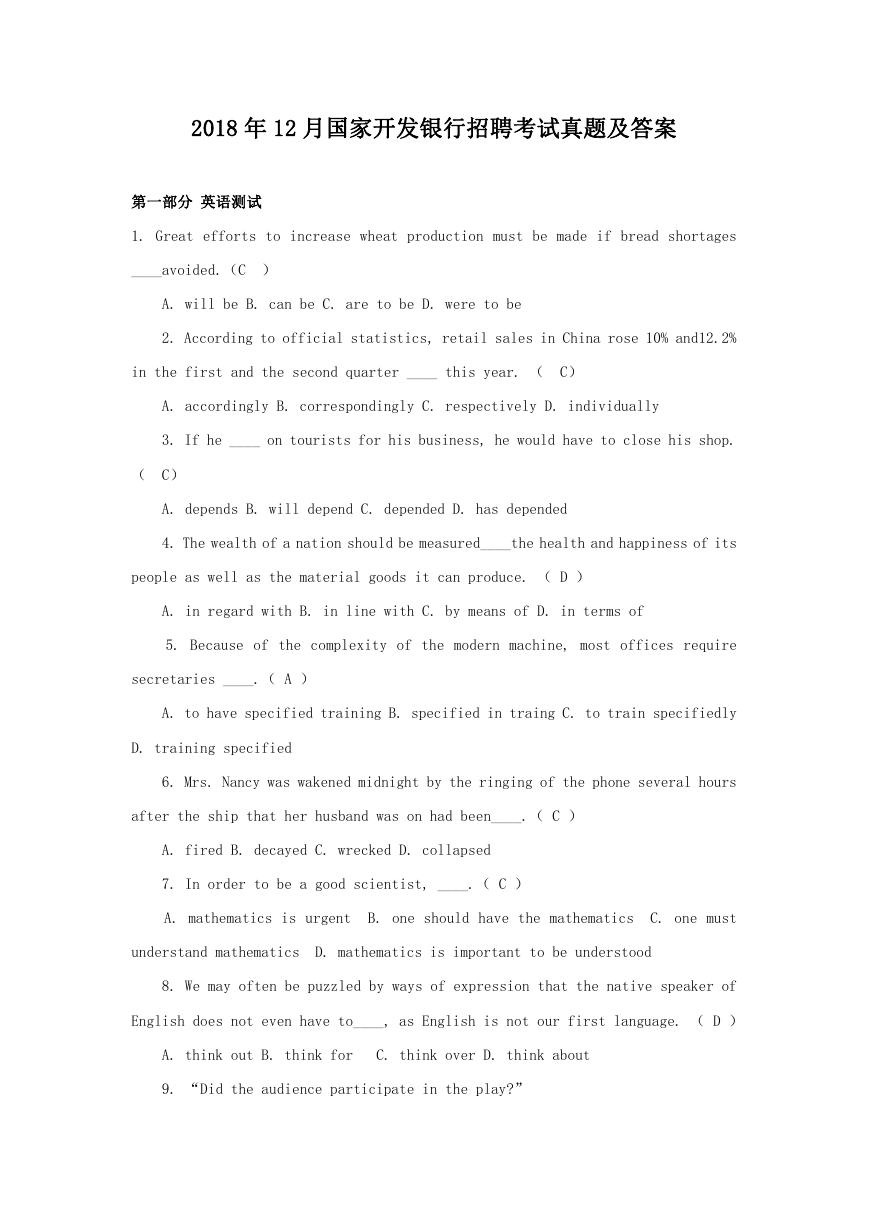
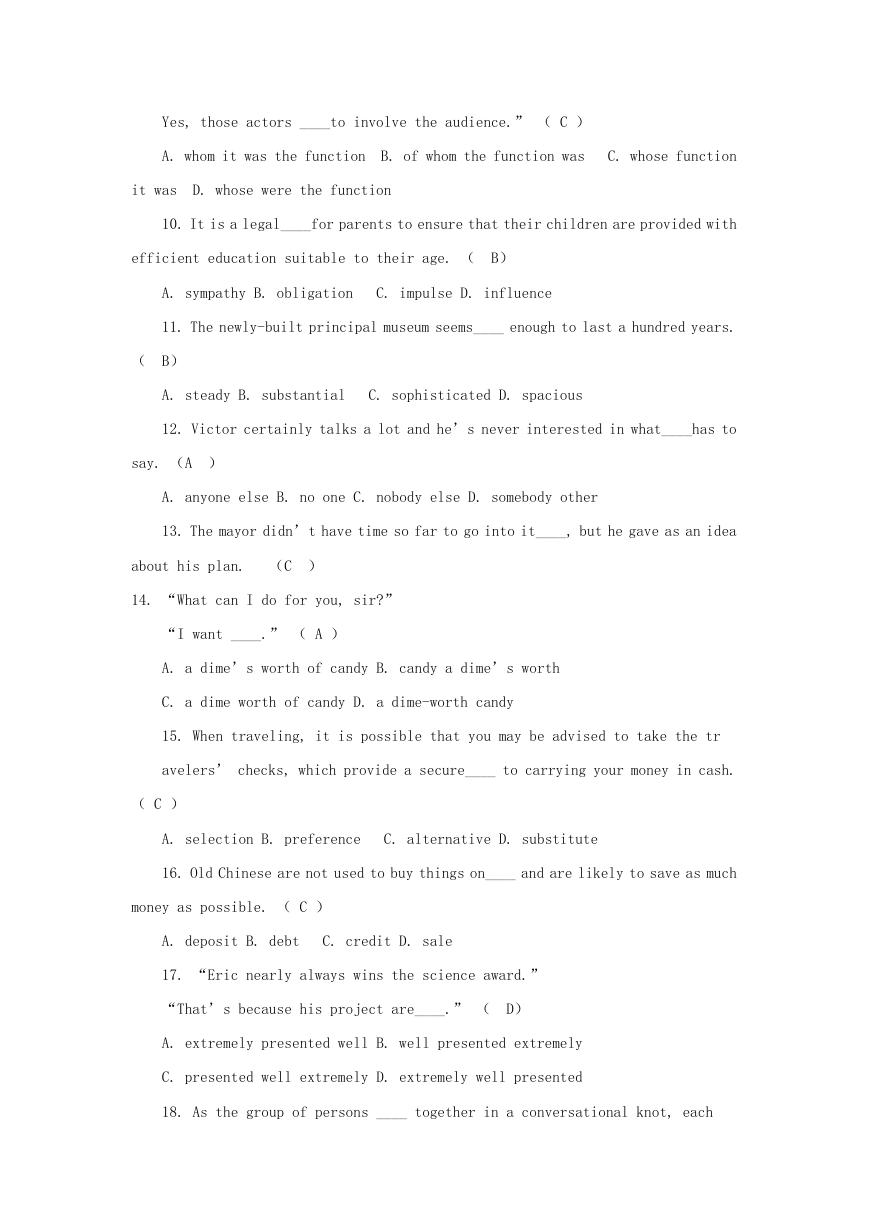
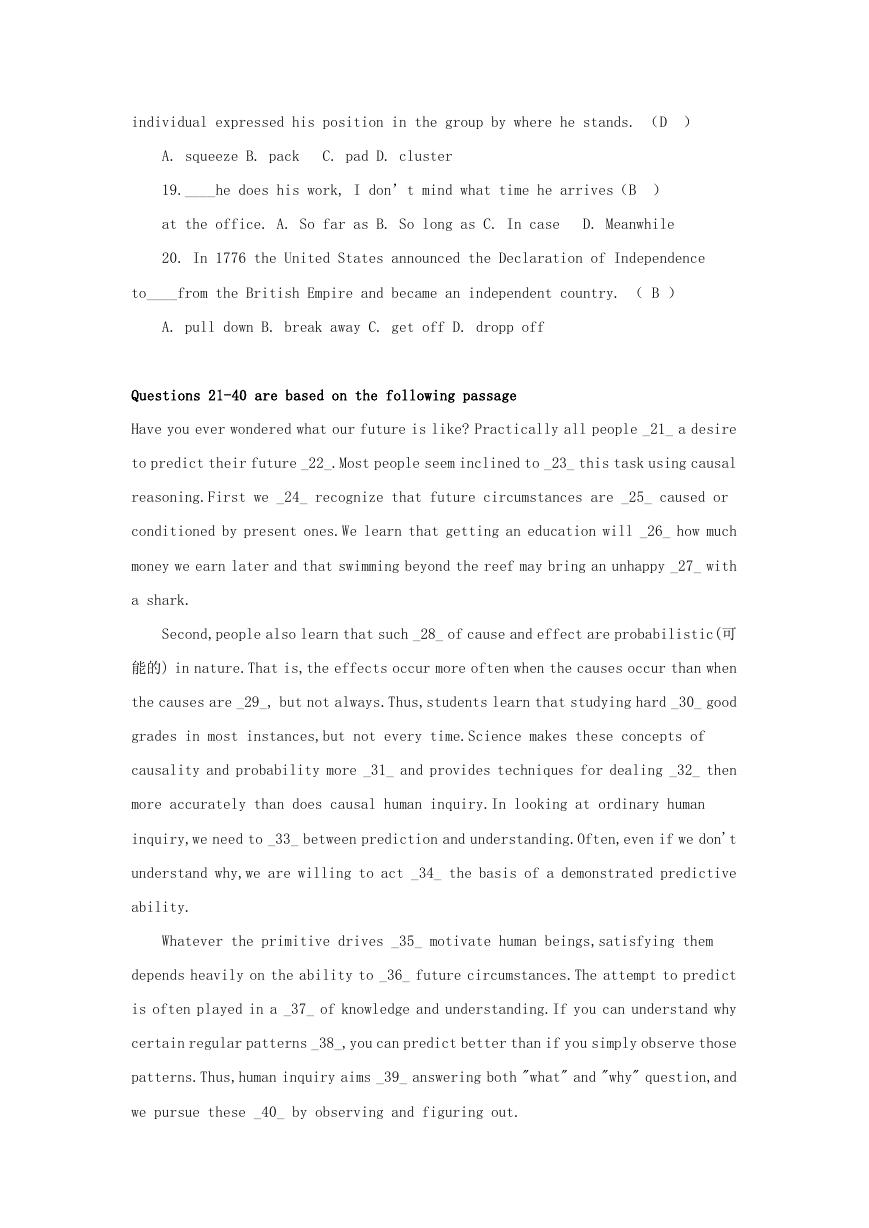

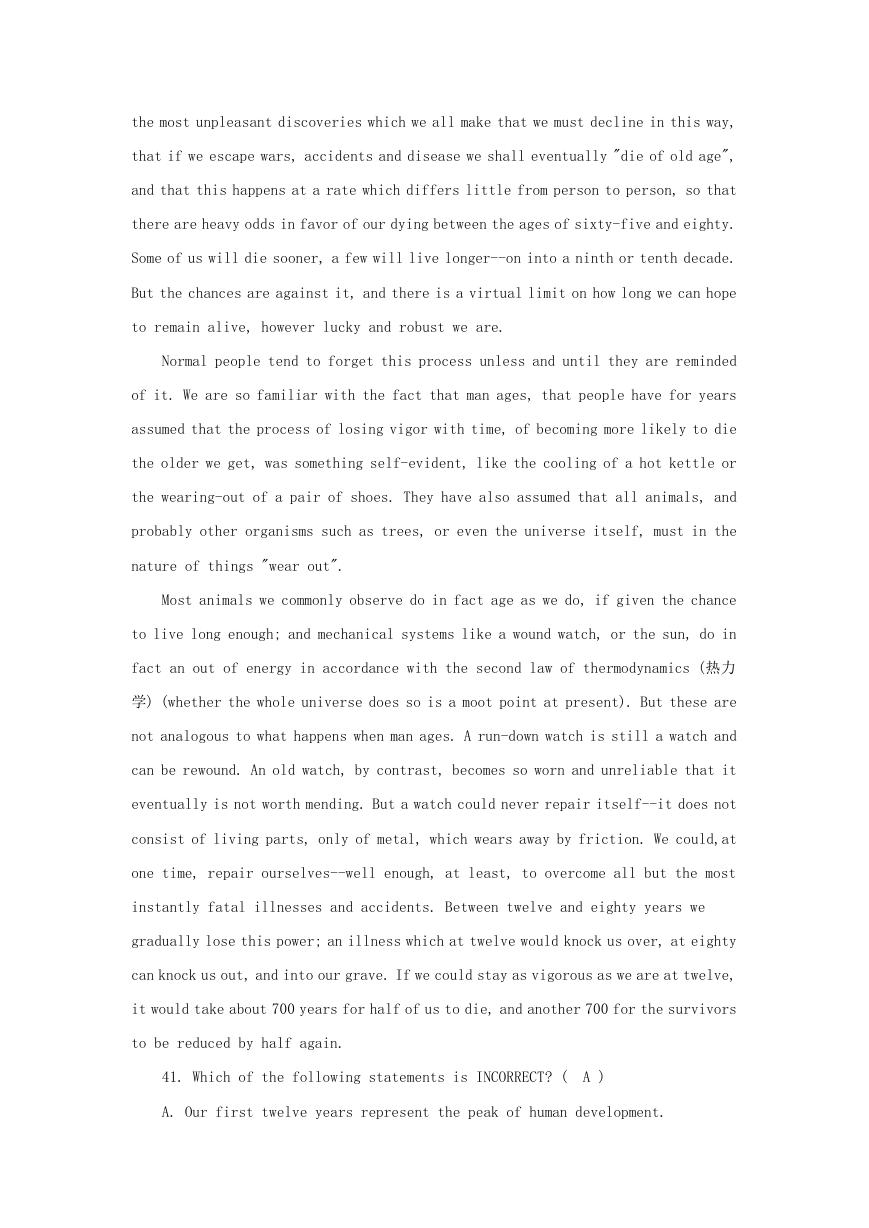

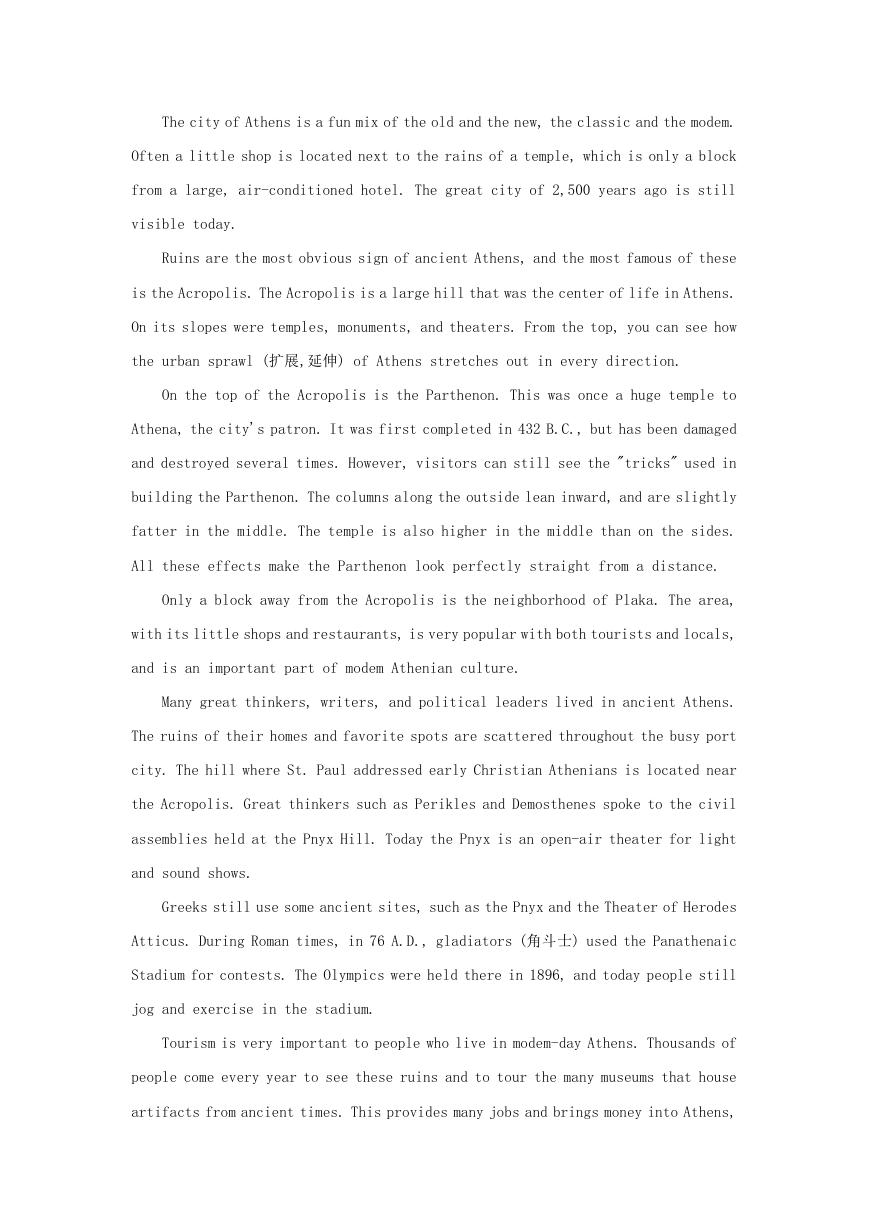









 2023年江西萍乡中考道德与法治真题及答案.doc
2023年江西萍乡中考道德与法治真题及答案.doc 2012年重庆南川中考生物真题及答案.doc
2012年重庆南川中考生物真题及答案.doc 2013年江西师范大学地理学综合及文艺理论基础考研真题.doc
2013年江西师范大学地理学综合及文艺理论基础考研真题.doc 2020年四川甘孜小升初语文真题及答案I卷.doc
2020年四川甘孜小升初语文真题及答案I卷.doc 2020年注册岩土工程师专业基础考试真题及答案.doc
2020年注册岩土工程师专业基础考试真题及答案.doc 2023-2024学年福建省厦门市九年级上学期数学月考试题及答案.doc
2023-2024学年福建省厦门市九年级上学期数学月考试题及答案.doc 2021-2022学年辽宁省沈阳市大东区九年级上学期语文期末试题及答案.doc
2021-2022学年辽宁省沈阳市大东区九年级上学期语文期末试题及答案.doc 2022-2023学年北京东城区初三第一学期物理期末试卷及答案.doc
2022-2023学年北京东城区初三第一学期物理期末试卷及答案.doc 2018上半年江西教师资格初中地理学科知识与教学能力真题及答案.doc
2018上半年江西教师资格初中地理学科知识与教学能力真题及答案.doc 2012年河北国家公务员申论考试真题及答案-省级.doc
2012年河北国家公务员申论考试真题及答案-省级.doc 2020-2021学年江苏省扬州市江都区邵樊片九年级上学期数学第一次质量检测试题及答案.doc
2020-2021学年江苏省扬州市江都区邵樊片九年级上学期数学第一次质量检测试题及答案.doc 2022下半年黑龙江教师资格证中学综合素质真题及答案.doc
2022下半年黑龙江教师资格证中学综合素质真题及答案.doc